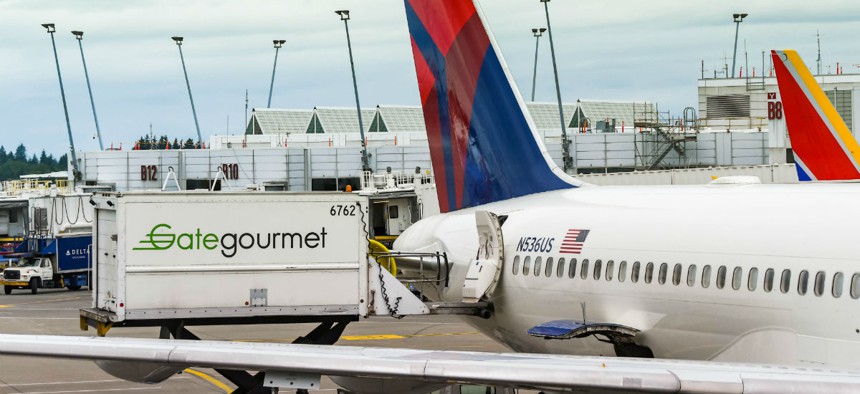
Whistleblower had revealed that airport food trucks are not inspected if they are run according to religious precepts. By Ceri Breeze / Shutterstock.com
TSA Whistleblower Disclosures Prompt Two Aviation Security Probes
Office of Special Counsel orders DHS to examine breakdowns in food and drug handling on planes.
The Homeland Security Department late last month was ordered to reexamine precautions against the risk of attacks on airplanes using deadly chemicals and other threats, acting at the behest of the agency in charge of protecting whistleblowers governmentwide.
The Office of Special Counsel, in a vindication for longtime Transportation Security Administration whistleblower Robert MacLean, in December ordered Homeland Security Secretary Kirstjen Nielsen to investigate and report back on two of MacLean’s disclosures from last year.
As described by his attorneys at the Government Accountability Project, MacLean had revealed that the TSA has not ensured that air marshals and flight crews on each flight pack NARCAN, the antidote for the potentially fatal chemical carfentanil. He also disclosed that TSA does not inspect food trucks at airports if they are run according to religious precepts.
“This order marks a major victory for both whistleblowers and aviation security in general, as the OSC cannot order investigations without first finding a 'substantial likelihood' that the whistleblower is correct,” the attorneys group said. “Further, carfentanil could be America’s greatest vulnerability for airplane safety, as it is roughly 100 times more deadly than the opioid fentanyl and can be easily concealed and dispersed as an aerosol.”
The antidote kits are routinely used by local law enforcement, but TSA has not mandated such equipment, the attorneys said. (Due to the government shutdown, TSA could not be reached for comment.)
MacLean—whose dismissal as an air marshal for safety risk disclosures in 2003 prompted a successful Supreme Court challenge—also uncovered “an unwritten rule” at TSA that religious food trucks are exempt from security inspections. “Although numerous other federal air marshals have confirmed his concerns, the agency refused to take corrective action,” the attorneys said.
“Synthetic opioids such as fentanyl and carfentanil are exceptionally dangerous drugs that are far too easy to obtain and sneak on to planes,” MacLean said in a release. “At the weapons screening checkpoints, there’s too much focus on treating passengers as suicidal threats, which makes it much easier for a terrorist organization to recruit or deceive airport employees to smuggle life-threatening materials into their work area and onto a jet.”
Special Counsel Henry Kerner has intervened several times this year in TSA employment and security cases. “Mr. MacLean’s record since reinstatement illustrates why America needs a Whistleblower Protection Act,” said MacLean’s attorney, Tom Devine. “Four times he has exposed aviation security breakdowns that could enable a new 9/11, and four times TSA has ignored him…. The irony is that the more Mr. MacLean challenges security breakdowns, the more determined TSA is to purge him.”
MacLean, who has been fighting make-work assignments and what he sees as efforts to fire him since his reinstatement, told Government Executive on Wednesday, "Pressure from Congress and the tireless work by the great people at the Office of Special Counsel [are] the only reasons why the TSA has not fired me again. I'm going on eight months since it served me with another termination proposal, took away my badge and gun, and makes me sit to watch paint dry in a remote contractors' building.” Since TSA rejected his request for a transfer to another agency, MacLean said, “it has used every dirty trick in the book to destroy my career and family."
Correction: The risks presented by the food trucks are general, not specific to contaminated food.







